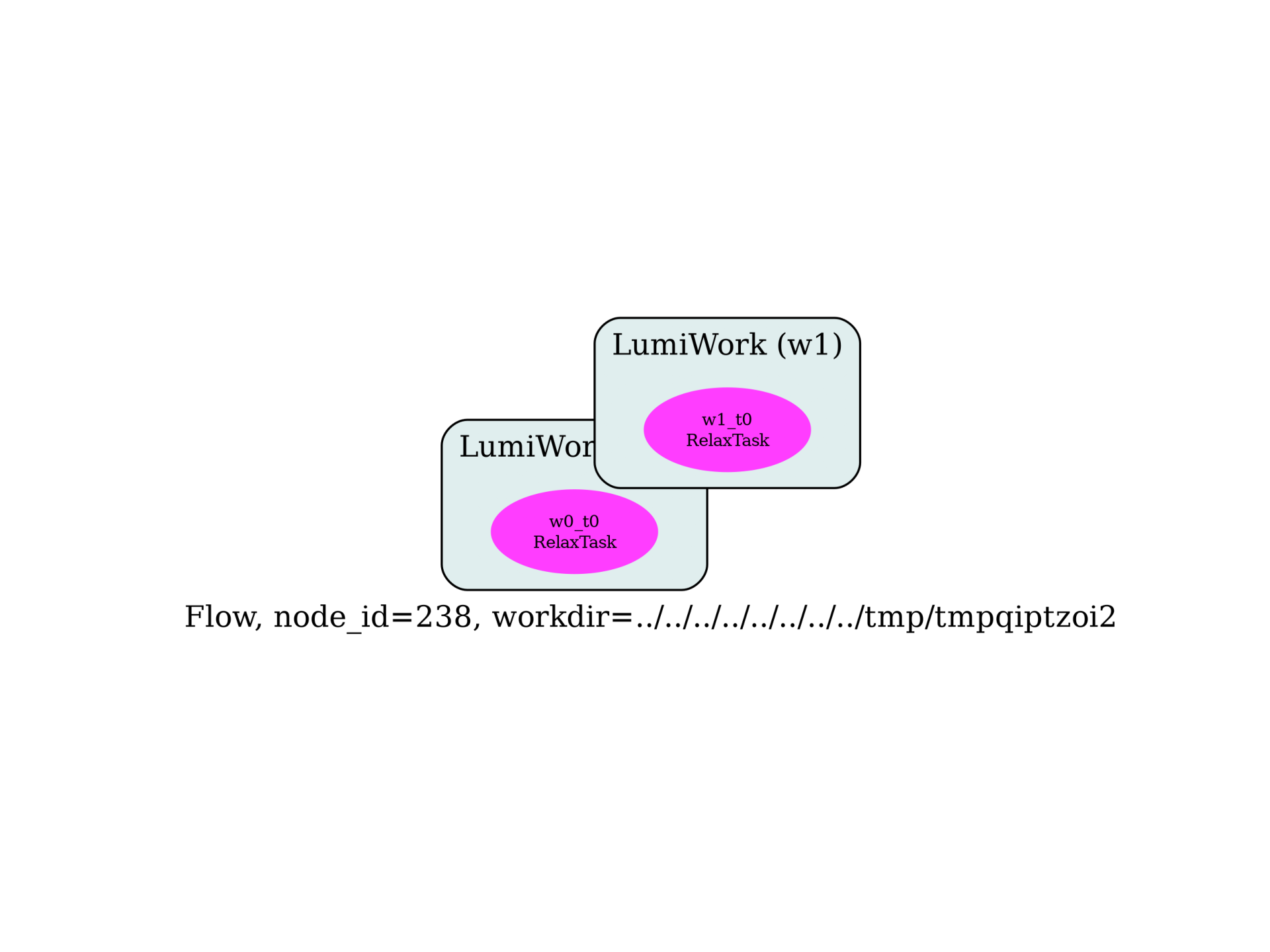Note
Go to the end to download the full example code.
Delta SCF calculation: luminescence of an Eu-doped phosphor
This example shows how to compute the luminescent properties of an Eu-doped phosphor. It uses a 36 atoms cell of SrLiAl3N4. Two non-equivalent Sr sites are available for Eu, resulting in two independent LumiWork. The creation of the supercells is done with make_doped_supercell().
Steps, for each structure:
Relaxation in the ground state.
Relaxation in the excited state, starting from the relaxed ground state. Created at run-time.
Scf computation in the relaxed/unrelaxed ground/excited state (4 computations).
Even if we use minimal settings, the workflow takes around one hour to run on one core. Filepaths of the six runs are stored in outdata/lumi.json of each work.
A quick post-processing is automatically done at the end of a LumiWork, and stored in outdata/Delta_SCF.json of each work, with relevant luminescent properties (ZPL energy, Stoke Shift, Delta Q,…), see abipy/lumi/delta_scf.py .

import sys
import os
import abipy.abilab as abilab
import abipy.flowtk as flowtk
import abipy.data as abidata
from abipy.core.structure import Structure
from abipy.flowtk.lumi_works import LumiWork
def get_non_eq_sites(structure, replaced_atom):
"""return a list of positions of non-equivalent sites for the replaced atom."""
irred = structure.spget_equivalent_atoms().eqmap # mapping from inequivalent sites to atoms sites
positions = structure.get_symbol2indices()[replaced_atom] # get indices of the replaced atom
index_different_sites = []
for i in positions:
if len(irred[i]) != 0:
index_different_sites.append(irred[i][0])
return index_different_sites
def make_doped_supercell(prim_structure,supercell_size,replaced_atom,dopant_atom):
"""return a list of doped supercell structure, one for each non-equivalent site of the replaced atom"""
my_structure = prim_structure.copy()
my_structure.make_supercell(supercell_size)
list_ineq_pos = get_non_eq_sites(my_structure, replaced_atom)
doped_structure_list = []
for pos in list_ineq_pos:
final_structure = my_structure.copy()
final_structure.replace(pos, dopant_atom)
doped_structure_list.append(final_structure)
return doped_structure_list
def scf_inp(structure):
pseudos = abidata.pseudos("Eu.xml", "Sr.xml","Al.xml","N.xml","Li.xml")
gs_scf_inp = abilab.AbinitInput(structure=structure, pseudos=pseudos)
gs_scf_inp.set_vars(ecut=10,
pawecutdg=20,
chksymbreak=0,
diemac=5,
prtwf=0,
nstep=300,
toldfe=1e-10,
chkprim=0,
nbdbuf=5 # help convergence
)
# Set DFT+U and spinat parameters according to chemical symbols.
#symb2spinat = {"Eu": [0, 0, 7]}
#symb2luj = {"Eu": {"lpawu": 3, "upawu": 7, "jpawu": 0.7}}
#gs_scf_inp.set_usepawu(usepawu=1, symb2luj=symb2luj)
#gs_scf_inp.set_spinat_from_symbols(symb2spinat, default=(0, 0, 0))
### Setting of the occupations, for spin up-dn in the ground/excited state
### Only valid for Eu doped
n_val = gs_scf_inp.num_valence_electrons
n_cond = round(15)
spin_up_gs = f"\n{int((n_val - 7) / 2)}*1 7*1 {n_cond}*0"
spin_up_ex = f"\n{int((n_val - 7) / 2)}*1 6*1 0 1 {n_cond - 1}*0"
spin_dn = f"\n{int((n_val - 7) / 2)}*1 7*0 {n_cond}*0"
nsppol = 2
shiftk = [0, 0, 0]
ngkpt = [1, 1, 1]
# Build SCF input for the ground state configuration.
gs_scf_inp.set_kmesh_nband_and_occ(ngkpt, shiftk, nsppol, [spin_up_gs, spin_dn])
# Build SCF input for the excited configuration.
exc_scf_inp = gs_scf_inp.deepcopy()
exc_scf_inp.set_kmesh_nband_and_occ(ngkpt, shiftk, nsppol, [spin_up_ex, spin_dn])
return gs_scf_inp,exc_scf_inp
def relax_kwargs():
# Dictionary with input variables to be added for performing structural relaxations.
relax_kwargs = dict(
ecutsm=0.5,
toldff=1e-4, # TOO HIGH, just for testing purposes.
tolmxf=1e-3, # TOO HIGH, just for testing purposes.
ionmov=2,
chkdilatmx=0,
)
relax_kwargs_gs = relax_kwargs.copy()
relax_kwargs_gs['optcell'] = 0 # in the ground state, allow relaxation of the cell
relax_kwargs_ex = relax_kwargs.copy()
relax_kwargs_ex['optcell'] = 0 # in the excited state, no relaxation of the cell
return relax_kwargs_gs, relax_kwargs_ex
def build_flow(options):
# Working directory (default is the name of the script with '.py' removed and "run_" replaced by "flow_")
if not options.workdir:
options.workdir = os.path.basename(sys.argv[0]).replace(".py", "").replace("run_", "flow_")
flow = flowtk.Flow(options.workdir, manager=options.manager)
#Construct the two structures (2 non-eq. sites for Sr) from the primitive cell of SLA (SrAlLi3N4)
#prim_structure=structure.Structure.from_file('SLA_prim.cif')
prim_structure = Structure.from_file(abidata.cif_file("SLA_prim.cif"))
supercell_matrix = [1,1,1] # Too small, just for test
strus=prim_structure.make_doped_supercells(supercell_matrix,'Sr','Eu')
####### Delta SCF part of the flow #######
# Create one LumiWork per structure
for stru in strus:
gs_scf_inp, exc_scf_inp = scf_inp(stru)
relax_kwargs_gs, relax_kwargs_ex = relax_kwargs()
lumi_work=LumiWork.from_scf_inputs(gs_scf_inp, exc_scf_inp, relax_kwargs_gs, relax_kwargs_ex)
flow.register_work(lumi_work)
return flow
# This block generates the thumbnails in the AbiPy gallery.
# You can safely REMOVE this part if you are using this script for production runs.
if os.getenv("READTHEDOCS", False):
__name__ = None
import tempfile
options = flowtk.build_flow_main_parser().parse_args(["-w", tempfile.mkdtemp()])
build_flow(options).graphviz_imshow()
@flowtk.flow_main
def main(options):
"""
This is our main function that will be invoked by the script.
flow_main is a decorator implementing the command line interface.
Command line args are stored in `options`.
"""
return build_flow(options)
if __name__ == '__main__':
sys.exit(main())
Total running time of the script: (0 minutes 3.699 seconds)